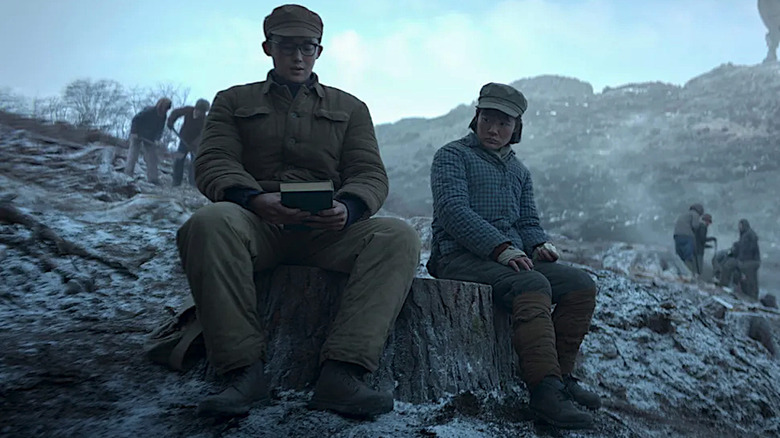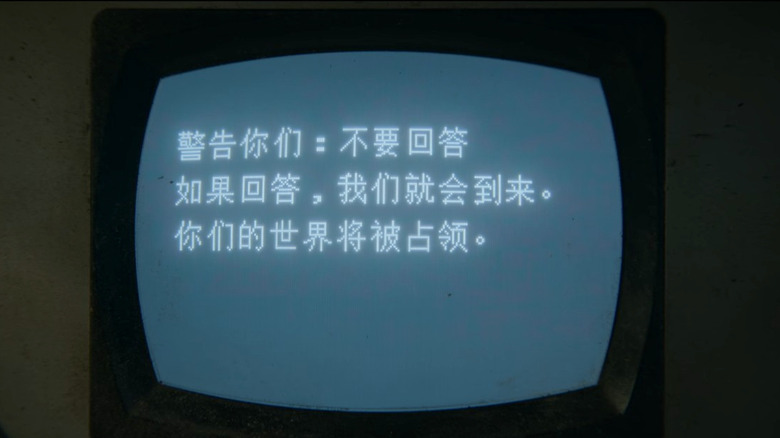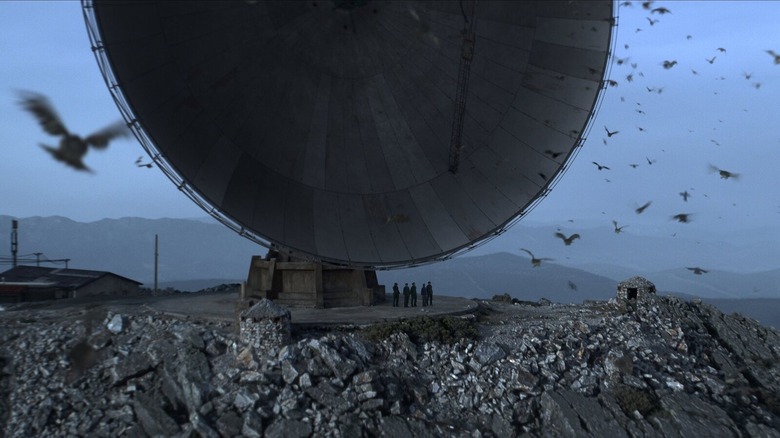Why Netflix's 3 Body Problem Is Causing Controversy And Outrage In China
Contains spoilers for "3 Body Problem" Season 1
"3 Body Problem" spent its first days steadily holding its position high on the Netflix streaming charts and gaining traction all over the world. The well-executed book adaptation effectively channels the beautiful chaos that helps "3 Body Problem" make existential dread look so good. It is so engrossing (particularly in the second half of Season 1) that it even has Netflix users warning each other about some of the film's more intense sequences.
The exciting new sci-fi series places a special emphasis on China (the home country of the book's author, Liu Cixin), and yet, the new adaptation only visits that part of the globe a few times. The opening sequence of Season 1 takes place in Beijing in 1966. Episode 7 also concludes with Ye Wenjie (Rosalind Chao) returning to the Red Coast satellite installation to meet her fate at the hands of the San Ti devotee Tatiana (Marlo Kelly).
These small but significant scenes in the Red Dragon have proven to be a sore spot for some Chinese audience members. (VPNs and pirated copies are making it possible to circumvent the strict geographic restrictions preventing the show from openly airing in the country.) One particular point of contention is the opening scene, which depicts the death of Ye Wenjie's father in a "struggle session" during the Cultural Revolution. The story progresses through that historical period on and off for a couple of episodes as it shows the protagonist forced into a labor camp and tortured. This serves as a catalyst for her later actions as she sends messages to Tri Solaris inviting them to, in her own words, "Come. We cannot save ourselves."
Chinese viewers have an issue with the portrayal of China in Netflix's show
According to CNN, the struggle session scene and death of Ye Wenjie's father takes place in the middle of the original Chinese version of "3 Body Problem" — this apparently contradicts certain reports that it is simply absent from that version due to censorship. However, the English version, expertly translated by Ken Liu, moves the scene to the beginning of the book with Liu Cixin's approval. This explains its leading role in the show's debut. Despite being technically book-accurate, this immediately sets a negative tone for China and the Cultural Revolution, and some Chinese viewers consider the scene to paint their country in a particularly harsh light.
The more global approach to Netflix's version of "3 Body Problem" has caused some Chinese social media users to accuse the show of positioning the story as the West saving the world from a Chinese disaster. "Netflix seems to deliberately want to convey a frightening message to its global audience: it is the Chinese who brought aliens to [Earth]," said one Weibo user, via Financial Times. The publication quoted another Chinese individual (who withheld their full name) who observed, "Netflix's adaptation cut the story out of Chinese cultural context and moved it to London."
Netflix's version of the story is certainly more global
If not completely Westernized, the new adaptation of "3 Body Problem" is, at the least, global in scope. There is a distinct de-emphasis on many of the Chinese elements. The cast is more diverse and much of the action takes place half a world away in London.
This isn't an accident. Showrunner David Benioff explained in an interview with The Guardian in March 2024, "We wanted people from all over the world. We tried to make this a very diverse, international cast to represent the idea that this isn't just one country's struggle – it's a global struggle to survive."
In another interview at that time with The Hollywood Reporter, Rosalind Chao (who is an actress of Chinese heritage) addressed the Cultural Revolution scenes. "I think it's important to have an international version of the story," she explained, adding a bit later, "I love that this has been made more international for a wider audience." She also said, "It's so ingrained not to discuss [the Cultural Revolution], whereas it's a huge part of history and the fact that it can be told here in a way that also embraces the sci-fi genre, it's kind of exciting. It's important for people to understand world history and what makes people the way they are."
Obviously, not everyone holds Chao's views. Many Chinese fans of Liu Cixin's books have flocked, instead, to a Chinese version of the show that came out in 2023. The 30-episode marathon (Netflix's version is only eight episodes long) offers a distinctly Chinese take on the story. (There's even a real-life murder in connection with "3 Body Problem" that is scarier than either adaptation for those fascinated by behind-the-scenes drama.)


